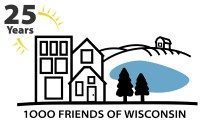New report highlights the growing need for transit access across the state.
MADISON – Today transit riders, activists and transportation experts gathered to release a first-of-its-kind report, Arrive Together: Transportation Access and Equity in Wisconsin. The study shows how the transportation system is failing to meet people’s needs in communities across Wisconsin. Authors examined the effectiveness of public transit access to major employers and other areas of interest in nine cities and regions across Wisconsin, including in Madison.
“Living in Madison has really influenced my perspective on transportation. Living somewhere with good public transit will be a key factor in deciding where I live after graduation. I grew up in Hudson, Wisconsin, right across the border from Minneapolis. There was no public transit available in Hudson, and there weren’t many bike lanes or paths either. If you wanted to have a job, you needed a car. I would love to see more communities around the state start thinking about public transportation the way that Madison does.” – Marina Minic, UW Madison sophomore and WISPIRG volunteer.
While Madison Metro connects thousands of riders each day to jobs and other destinations, many others struggle to access opportunity due to long travel times and cumbersome transfers.
Statewide, the report’s authors identify a lack of transit access to school, work, the grocery store, the doctor’s office, and other needs. These gaps in the transportation system disproportionately impact those who are unable to drive or cannot afford to drive – including seniors, people with disabilities, low- to middle-income Wisconsinites, and young people.
“Of the nearly 670,000 Wisconsin adults with disabilities, many are transportation dependent, either due to the disability directly or to higher poverty rates among this population. Access to transportation options that allow for mobility within our neighborhoods, across town and between communities is a quality of life issue impacting employment, health and safety civic engagement and social opportunities” said Denise Jess, Executive Director of the Wisconsin Council of the Blind and Visually Impaired.
In Madison, communities of color have less frequent service due to their distance from the city center. Routes that do pass through these neighborhoods often do not connect easily to job hubs and instead revolve around Madison Metro transfer points, the report found.
The report concludes that, while each community faces unique challenges in providing transportation access to employment, medical services, major businesses, local attractions or other points of interest, the absence of consistent and sufficient funding for public transportation is a major hurdle across the board. Demographic changes will likely exacerbate these challenges in the future: Statewide, communities are already struggling to meet the transportation needs of a growing population of seniors, and to retain young people who increasingly want to live in transit-friendly, walkable, bikeable towns and cities. The authors identify increased transit funding and better coordination between municipalities as viable solutions to many transportation challenges outlined in the report.
“We need to get our priorities straight, it is imperative that we increase funding for public transportation in the state budget that will allow for much needed transit capital improvements, new routes and increased frequency of service. The state must also enable the creation of regional transportation options that will connect Wisconsin communities to each other and open up access to opportunity” said Ashwat Narayanan, Director of Transportation Policy at 1000 Friends of Wisconsin.
Arrive Together: Transportation Access and Equity in Wisconsin was released by 1000 Friends of Wisconsin, Chippewa Valley Transit Alliance, CUSH, NAOMI, MICAH, ESTHER, Sierra Club – John Muir Chapter, SOPHIA, Wisconsin Council of the Blind and Visually Impaired and WISDOM, with support from the Wisconsin Public Interest Research Group (WISPIRG).
To view a full copy of the report and learn more visit: https://1kfriends.org/arrive-together-report
